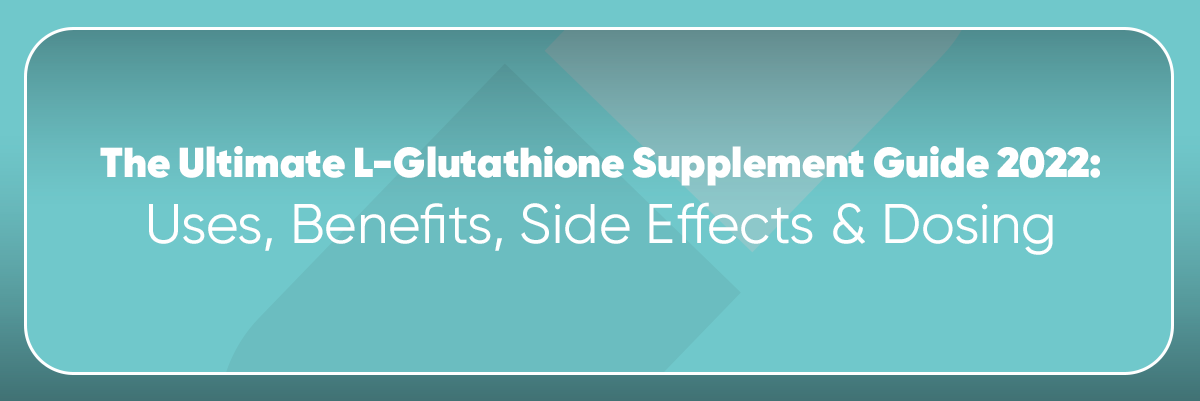L-Glutamine Supplements Guide: Benefits, Side Effects
If you’re interested in taking L-Glutamine powder and would like to learn more about it, this guide will provide all the information you need to use this supplement with confidence. This guide will cover several topics, including:
- What Is L-Glutamine?
- L-Glutamine Vs Glutamine
- What Foods Are High In L-Glutamine?
- 3 Benefits Of L-Glutamine
- When To Take L-Glutamine?
- How Much L-Glutamine Should I Take?
- What Are The Side Effects Of L-Glutamine?
- What Is The Best L-Glutamine Supplement?
- Does L-Glutamine Powder Expire?
What Is L-Glutamine?
Glutamine is an amino acid with many important roles within the body, from supporting our immune systems to intestinal health. The main role of amino acids is to act as building blocks for proteins, and proteins are a vital element in many functions, including transportation, metabolism and tissue repair. Although Glutamine is not an essential amino acid as your body naturally produces it, your body can benefit from extra glutamine consumed from foods and supplements.
L-Glutamine Vs Glutamine
Practically speaking, there’s no difference between L-Glutamine and Glutamine. L-Glutamine is an isomer of glutamine, meaning a slightly different molecular structure. Simply put, L-Glutamine is not bonded to other amino acids. L-Glutamine is the supplementary form, which can also be found in food, and is produced by our bodies.
What Foods Are High In L-Glutamine?
Interestingly, it is estimated that the average person consumes 3 to 6 grams of Glutamine per day. Foods that are high in Glutamine are:
- Eggs
- White Rice
- Beef
- Corn
- Tofu
The percentage of protein made up of L-Glutamine in these foods ranges from 4.4 to 16.2%. The amount of L-Glutamine per 100g ranges from 0.3 to 1.2g. For example, the percentage of protein made up of L-Glutamine in beef is 4.4%, however, this food has a high protein content, it delivers 1.2g of Glutamine per 100g. Whereas the percentage of protein made up of L-Glutamine in corn is 16.2%, but only delivers 0.4g per 100g due to having a lower protein content (1).
Therefore, if you want to consume more Glutamine with supplementation, you should increase your protein intake. However, similarly to protein shakes, supplementation makes reaching targets a lot easier and more time efficient. 3
Benefits Of L-Glutamine
Now we know what L-Glutamine is and how it works within the body, let’s explore its benefits;
Glutamine Strengthens Your Immune System
The importance of a healthy immune system can not be understated. When our immune system is compromised, we can have anything from tummy troubles to regular infections. Feeling weak and unwell can negatively affect training progression and one's sense of well-being. In order to consistently feel and perform at your best, you need a healthy and strong immune system.
Glutamine is a vital source of energy for immune cells, including white blood cells (2). However, when the demand for glutamine is greater than the production, your body breaks down muscle protein to free up more of this amino acid. Research has suggested that glutamine supplements improve health, fight infections and shorten hospital stay post-surgery (x), indicating immune-boosting effects.
Major injuries and surgery can reduce blood glutamine, and high protein diets or glutamine supplements are often prescribed to this population. Although there isn’t a great deal of science assessing glutamine's ability to strengthen your immune system, there are many that have shown it to help those who are critically ill or recovering from surgery, indicating that it gives the body what it needs to heal and develop.
Glutamine Supports Muscle Development & Performance
As discussed, Glutamine is an amino acid, and therefore a building block for protein. Scientists have assessed whether supplementing glutamine improves muscle growth and athletic performance. Let’s see what they found;
A couple of studies found Glutamine to have no effects on muscle mass or performance when compared to placebo (4, 5). However, clinical studies have shown glutamine to decrease muscle soreness and improve muscle recovery post-workout (6), and effective recovery is associated with enhanced muscle development and therefore growth. Additionally, a study also found glutamine to reduce a blood marker of fatigue (7), ultimately delaying the time to fatigue, allowing for enhanced performance capabilities. Ultimately, more research is needed to decipher whether glutamine increases muscle growth and athletic performance. However, some research suggests that glutamine supplementation delays fatigue and increases muscle recovery rate, which is important for any sportsperson.
It’s also worth noting that athletes and active individuals generally consume more protein and therefore glutamine, so it's difficult to determine whether supplementation has an effect on those already consuming high amounts of glutamine.
Glutamine Supports Intestinal Health and Helps Heal Leaky Gut
Intestinal health is critical for general health and wellbeing, as it aids the digestion of food, absorption of nutrients and energy generation. Additionally, if your intestinal health weakens, so does your immune system, making good health harder to attain.
Firstly, the intestinal cells are arguably the most critical part of the immune system, as trillions of bacteria live there with immune functions. Fascinatingly, glutamine is an effective energy source for intestinal cells (X). Glutamine also protects against leaky gut, as it supports the maintenance of the barrier between the inside and outside your intestines (x).
The stops harmful bacteria from entering the rest of your body. Glutamine also promotes the growth and maintenance of intestinal cells (x). In conclusion, glutamine supports intestinal health, which is a major part of your immune system. It prevents leaky gut and supports intestinal cell development.
When To Take L-Glutamine?
There are no clear guidelines for when to take L-Glutamine, however, it is an amino acid, therefore, is best taken on an empty stomach. Anecdotal evidence suggests that it is best taken before bed. It is advised to supplement Glutamine every day for up to 14 weeks.
How Much L-Glutamine Should I Take?
There is no clear evidence to recommend a specific dosage because as little as 5 grams and as high as 45 grams have been prescribed. However, supplementing 5 grams (5000 mg) 1-3 times per day is generally advised. Bodybuilders usually take much higher doses.
What Are The Side Effects Of L-Glutamine?
It is suggested that short-term use of L-Glutamine supplements is safe. Long-term use effects are unknown. Therefore it is recommended to supplement 5 grams (5000 mg) daily and assess health before upping the dosage and duration. Reported side effects are generally mild and rarely occur.
Does L-Glutamine Powder Expire?
If your L-Glutamine has passed its expiry date, it has likely lost some potency. It is very unlikely to cause harm as it will not go rancid, but it is advised to use supplements before the expiry date to get their true benefits.
What Is The Best L-Glutamine Supplement?
The best L-Glutamine supplement is one that delivers 5 grams (5000mg) per serving. This favours powders as multiple capsules would need to be taken to match this dosage, as a capsule can generally contain 750mg at maximum.
German Pharma L-Glutamine delivers 5 grams of micronised L-Glutamine powder per scoop, and 100 servings per container, providing 14 weeks' worth of supplementation.
Nutritionist Thomas Delauer has a great video on the benefits of L-Glutamine :






Leave a comment
All comments are moderated before being published.
This site is protected by hCaptcha and the hCaptcha Privacy Policy and Terms of Service apply.